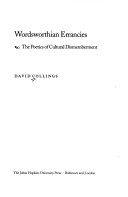According to David Collings, Wordsworth interpreted the outbreak of war between England and France in 1793 as a cataclysmic event, one whose utterly disfiguring effect he would trace in his work over the next decade. Expanding upon this extravagant interpretation of events, Collings argues, Wordsworth constructed a poetics of cultural dismemberment - a way for culture to imagine that it survives in the midst of its own destruction. In this book, Collings challenges prevailing critical approaches to Romantic poetry by describing and critiquing this deconstructive account of culture in Wordsworth's poetry. Drawing ideas from deconstruction, psychoanalysis, Marxism, feminism, and "queer" theory, Colling's reading reveals a different Wordsworth, one who is far more concerned with various "queer" modes of sexuality than previously suspected. In a reading of "The Prelude", for example, Collings argues that Wordsworth associated his poetic power with homoerotic masochistic fantasies and with his involuntary delight in traumatic events.
He also redefines the debate concerning the politics of Wordsworth's poetry: disputing recent critics who claim that Wordsworth retreated from history into a poetry of the self, Collings argues instead that the very notion of the solitary, autobiographical subject derived from Wordsworth's sense of cultural trauma.
- ISBN10 0801848482
- ISBN13 9780801848483
- Publish Date 1 September 1994
- Publish Status Out of Stock
- Out of Print 8 August 2014
- Publish Country US
- Imprint Johns Hopkins University Press
- Format Hardcover
- Pages 312
- Language English
